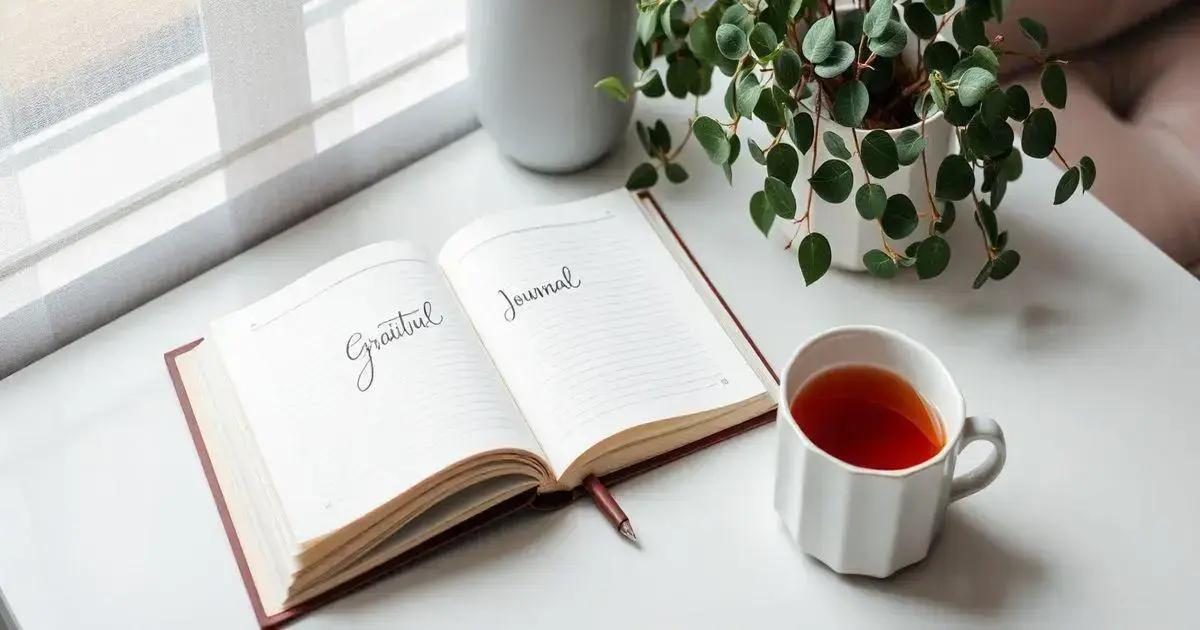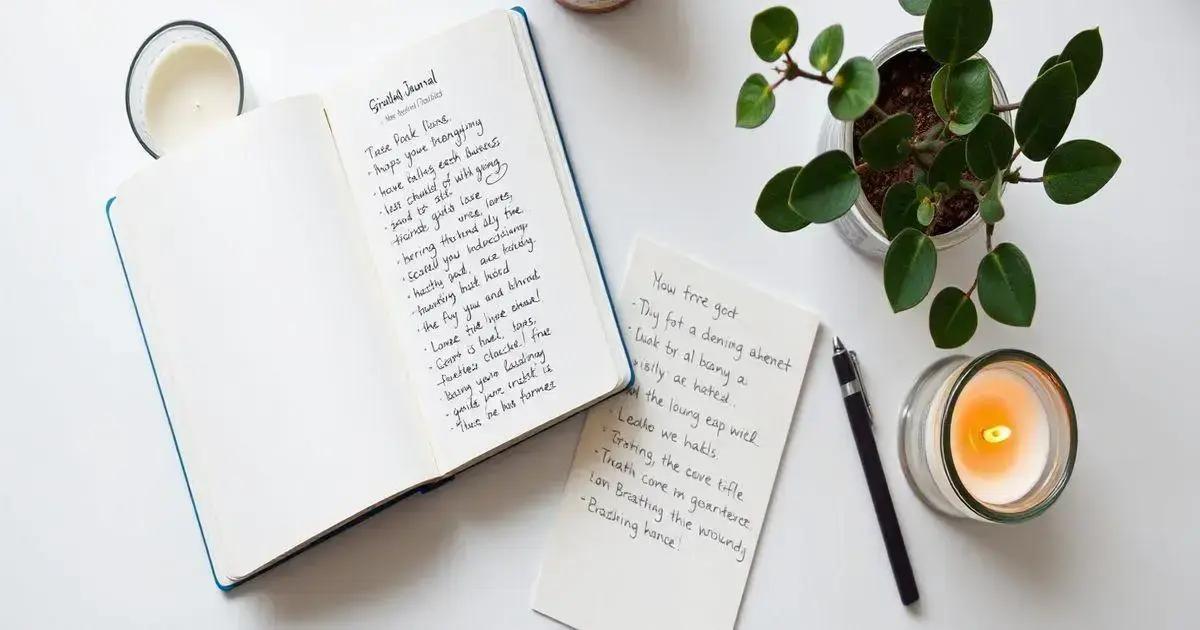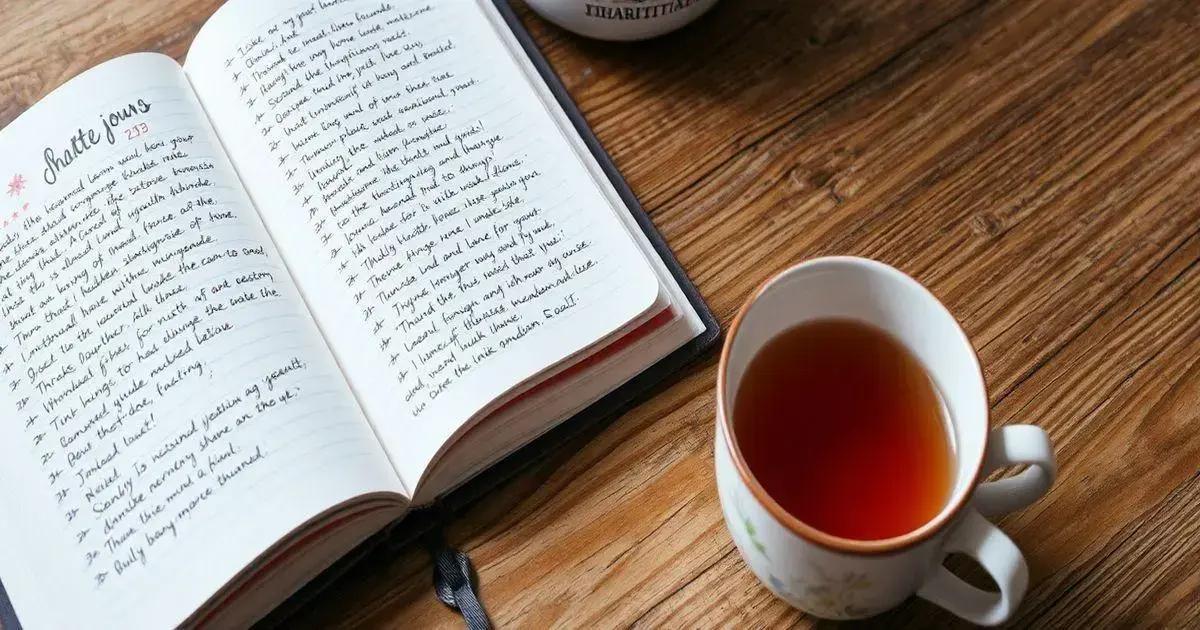The rise of daily gratitude journals for men’s mental health offers a simple yet powerful tool to improve emotional well-being, reduce stress, and strengthen relationships by encouraging positive reflections on daily experiences.
The rise of daily gratitude journals for men’s mental health has sparked interest among those seeking to improve their emotional well-being. These journals serve as a simple yet powerful tool that encourages men to reflect on their lives, fostering a positive mindset. In this article, we will explore the benefits of these journals, how to initiate a daily gratitude practice, and share inspiring success stories that underline their effectiveness.
Understanding Daily Gratitude Journals

Understanding daily gratitude journals is important for enhancing mental health, especially among men. A daily gratitude journal is a personal space where individuals write down things they are thankful for each day. This practice encourages positive thinking by highlighting the good aspects of life, no matter how small.
The Basics of Gratitude Journals
Gratitude journals can vary greatly in format. Some people write a few sentences, while others may list several items daily. The key is consistency and the act of focusing on positive experiences. This practice has been found to help shift perspectives from negative to positive.
How It Works
Writing in a gratitude journal activates brain regions related to emotional regulation and rewards. It can improve mood, decrease anxiety levels, and provide a sense of purpose. By reflecting on what they appreciate, men can foster resilience and cope better with daily stressors.
Finding Meaning
For many, this practice leads to a deeper understanding of what truly matters in their lives, from relationships to personal achievements. It allows for self-reflection and acknowledgment of goals, which contributes to overall well-being.
By exploring their thoughts and feelings through journaling, men can better manage their emotional health, making gratitude journals a vital tool for maintaining mindfulness and positivity in a fast-paced world.
Benefits for Men’s Mental Health

Daily gratitude journals provide numerous benefits for men’s mental health. Engaging in this practice can significantly enhance one’s emotional well-being and resilience. Here are some key benefits:
Improved Mood
Writing about things for which you are grateful can lead to a more positive outlook on life. Studies have shown that expressing gratitude can boost serotonin levels, leading to an improved mood and overall happiness.
Stress Reduction
Gratitude journaling helps men manage their stress by shifting focus from negative thoughts to positive ones. This simple act of reflection can provide a calming effect, making it easier to face daily challenges.
Enhanced Relationships
Keeping a gratitude journal can strengthen relationships by encouraging men to acknowledge and appreciate their loved ones. Taking time to recognize the good in others can lead to improved communication and stronger bonds.
Increased Self-Esteem
Regularly practicing gratitude enables men to reflect on their strengths and accomplishments. This acknowledgment increases self-esteem and promotes a sense of worthiness, which is vital for mental health.
Overall, the benefits of daily gratitude journals for men’s mental health are profound. They provide essential support in cultivating a positive mindset, reducing stress levels, and fostering better relationships.
How to Start a Daily Gratitude Practice

Starting a daily gratitude practice is simple and rewarding. Follow these steps to create a habit that can enhance your mental health.
Choose Your Journal
First, select a journal that resonates with you. It can be a traditional notebook, a digital app, or even a simple piece of paper. Make sure it is something you enjoy using, as this will motivate you to keep writing.
Set a Time
Pick a specific time each day to write in your gratitude journal. Many people find that writing in the morning or before bed works best. Stick to this schedule to develop consistency.
Start Small
Begin by writing down just one to three things you are grateful for each day. They can be as simple as a delicious meal or a friendly chat with someone. As you grow comfortable, you can increase the number of items.
Be Specific
Instead of writing “I am grateful for my friends,” try to be specific like “I am grateful for Tom’s support during my tough week.” This helps deepen the emotional impact of the practice.
Reflect on Your Entries
At the end of each week or month, take time to review your entries. This reflection can reinforce positive feelings and provide insights into what matters most in your life.
By following these steps, you can establish a meaningful daily gratitude practice that contributes positively to your mental health and overall well-being.
Real-Life Success Stories

Real-life success stories highlight the transformative power of daily gratitude journals. Here are a few inspiring examples:
Mark’s Journey
Mark, a 32-year-old engineer, struggled with anxiety and feelings of inadequacy. After starting a daily gratitude journal, he began to recognize the positive moments in his life. He started writing about his family, his job, and even small victories like completing a challenging project. Over time, Mark reported feeling less anxious and more connected to his life.
Jake’s Transformation
Jake, a 28-year-old teacher, faced burnout and low self-esteem. He learned about gratitude journaling through a workshop and decided to give it a try. Writing down three things he was grateful for each day changed his perspective. He began to feel more fulfilled at work and rekindled his passion for teaching.
Tom’s Enhanced Relationships
Tom, 40, was going through a tough time in his marriage. He started using a gratitude journal to focus on the positive traits of his spouse. By writing down what he appreciated about her, he noticed a shift in his feelings and behavior. This practice led to improved communication and intimacy in their relationship.
Chris’s Boosted Self-Esteem
Chris, a 25-year-old college student, often felt lost and unmotivated. After starting his gratitude journal, he focused on his achievements, no matter how small. This practice boosted his self-esteem and provided him with the motivation to pursue new goals and experiences.
These real-life success stories showcase how daily gratitude journals can significantly impact men’s mental health and well-being.
Embracing Gratitude for a Better Future
The rise of daily gratitude journals has become a powerful tool for enhancing men’s mental health. By recognizing and appreciating the positive aspects of life, individuals can improve their mood, reduce stress, and strengthen relationships.
Starting a gratitude practice is simple and can lead to profound effects on emotional well-being. Real-life success stories demonstrate the tangible benefits that come from committing to this practice consistently.
As more men turn to gratitude journaling, we can expect to see a positive shift in mental health awareness and support, fostering resilience and connection in our communities. Remember, each day presents an opportunity to reflect and be thankful, paving the way for a brighter tomorrow.
FAQ – Frequently Asked Questions about Daily Gratitude Journals for Men’s Mental Health
What is a daily gratitude journal?
A daily gratitude journal is a personal record where individuals write down things they are thankful for each day to promote a positive mindset.
How can gratitude journaling improve mental health?
Gratitude journaling has been shown to reduce stress, improve mood, enhance relationships, and increase self-esteem, leading to better overall mental health.
How do I start my own gratitude journal?
Choose a journal that you like, set a consistent time each day to write, start with one to three items you are grateful for, and be specific in your entries.
Can I use a digital tool for my gratitude journal?
Yes, many people prefer using digital apps or even simple note-taking tools on their phones for convenience and accessibility.
How often should I write in my gratitude journal?
For the best results, write in your gratitude journal daily. Consistency helps reinforce the positive effects of the practice.
Are there any success stories related to gratitude journaling?
Yes, many individuals report significant improvements in their mental health, relationships, and overall well-being after starting a gratitude journaling practice.













